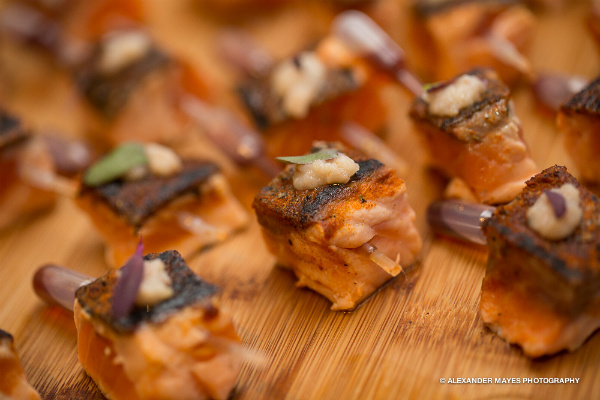The space is booked, the budget finalised, and the guests invited. It's going to be the biggest event of the year, with big names flying in from around the globe to discuss partnerships, endorsements. Some might be wary of dairy; others might wish never to see shellfish. As an event planner, how can you accommodate all your guests' dietary restrictions?
Know the Big Eight Food Allergies
According to the Australian Society of Clinical Immunology and Allergy (ASCIA), approximately 1 in 50 Australian adults have food allergies. Ninety percent of all food-related allergic reactions stem from eight foods: milk, eggs, tree nuts, peanuts, wheat, soy, fish, and shellfish.
1. Milk
All dairy products contain milk, and it is a core ingredient in many dishes. Creams, sauces, cheese, and butter are all common sources. Milk allergies are different from lactose intolerance, which usually isn't life-threatening. Coconut milk makes a good substitute.
2. Eggs
Eggs make the base for many sauces, dressings, and condiments, including hollandaise, mayonnaise, custard, and creams. Egg yolks are also used as a glaze on baked goods and as a binding agent for soups, broth, and desserts like pudding and ice cream. Egg substitutes include tofu, applesauce, bananas, and pureed fruit.
3. Peanuts
A common ingredient in desserts and Eastern dishes, peanuts can even appear in soup crackers and carb-based treats such as muffins and cakes. Peanut butter may be present in some sauces, and peanut oil finds its way into many pre-packaged foods. Sunflower seeds may make a safe substitute.
4. Tree nuts
These are the nuts often found alongside peanuts in cans of mixed nuts on store shelves. They include almonds, hazelnuts, walnuts, pistachios, cashews, chestnuts, Macadamia nuts, and Brazil nuts. Peanut and tree nut allergies may intertwine, as many products containing one may have come into contact with the other through manufacturing and sorting. Tree nuts can be found in cookies, chocolates, flavoured coffee, sauces, marinades, and a variety of desserts. Though uncommon, some alcoholic beverages may contain tree nut extracts. If several of your guests report peanut or tree nut allergies, it may be best to strike both from the menu.
5. Wheat
Wheat is commonly found in pastas, bread, and bagels. Unexpected sources of wheat include soy sauce, food starch, beer, and ale. Many people are more specifically allergic to gluten, a protein abundant in wheat and other grains such as rye and barley. Corn and rice are generally safe substitutes.
6. Soy
While less common in Australia than in other countries like the United States, soy allergies are still prevalent. If your guests report soy allergies, be wary of Asian cuisine, which may contain trace amounts of soy even if listed as soy-free. Foods that may contain soy include tofu, tempeh, baked goods, canned foods, desserts, and processed meats.
7. Fish
Fish proteins can trigger allergic reactions not only when consumed, but also when released into the air during cooking. Some sauces, dressings, and relishes may also contain fish, as may meatloaf.
8. Shellfish
Shellfish comprise a large group of invertebrates including crabs, lobsters, shrimp, and mollusks. Like fish allergies, shellfish allergies can be triggered by airborne proteins. Although fish and shellfish allergies are unrelated, cross-contamination is common in during food preparation.
Choose an Adaptable Caterer
Many catering services have their own procedures for handling specific dietary needs. The easiest way to make sure these needs are met is to hand out a form for your guests to fill out and return to you at least two weeks prior to the event. Make sure all guests receive the form and know how to complete it. Passing this information to the caterer gives them plenty of time to prepare special dishes or avoid certain ingredients altogether if many guests report allergies.

Before you hire a caterer for your next corporate event, get as much information as you can:
- Does the caterer label food allergies on the menu? Many already do, and others can add them without too much hassle.
- Can the caterer accommodate special orders for guests with specific food allergies or medically restricted diets? Savvy caterers knows how to make substitutions like a veteran rugby coach.
- Does the menu offer vegan/vegetarian options or low sodium, low glycemic index choices?
- Can the chefs prepare any simple dishes that require only a few ingredients? They may come in handy if guests make last-minute changes to their orders.
- Can the caterer provide a list of ingredients for each dish, or can the chefs scan for food allergens before preparation? It doesn't hurt to ask.
Don't expect caterers to adapt to every dietary preference. However, preventing food allergies keeps the event safe and fun. It's best to meet with each potential caterer in person to discuss the issue. You'll know immediately if they're experienced enough to handle it.
Start with a Healthy Menu
Limiting the menu options to low-fat, low-sodium, and low-sugar can shave off a good portion of the common eight food allergies and other dietary restrictions. Opt for grilled or roasted selections over fried. Choose lean protein, and offer salads and other vegetable-focused dishes.

Get Specific with Guests
Not all food allergies are created equal. Some people can't ingest specific ingredients, while others may develop symptoms simply by being near the trigger. For example, peanut garnishes, peanut butter, and Pad Thai sauce are all no-goes for an allergic individual.
Also, don't assume that simply picking food allergens off of a prepared dish removes the danger. For example, people with celiac disease can develop life-threatening symptoms if they eat even a crumb of gluten in foods like wheat, barley, oats and bran.
If the dining area is adjacent to the kitchen, guests seated near the cooking area may be exposed to allergens in the steam. Have your guests distinguish between life-threatening allergies and light to moderate sensitivity. The more guests attending your event, the more thorough you'll have to be in collecting information.
With the right knowledge, the right preparation, and the right caterer, you can ensure that the handshakes and clinking glasses go over smoothly at your next event.
At Laissez, helping our customers ensure that their menu selections are appropriate and cater to the many dietary needs of the attendees is a key part of the planning process, and something we have years of experience with. If you'd like help planning your next event please contact us to discuss your needs further.
Check out our Everyday Conference menu by clicking on the banner below and ask our team about dietary requirements.
